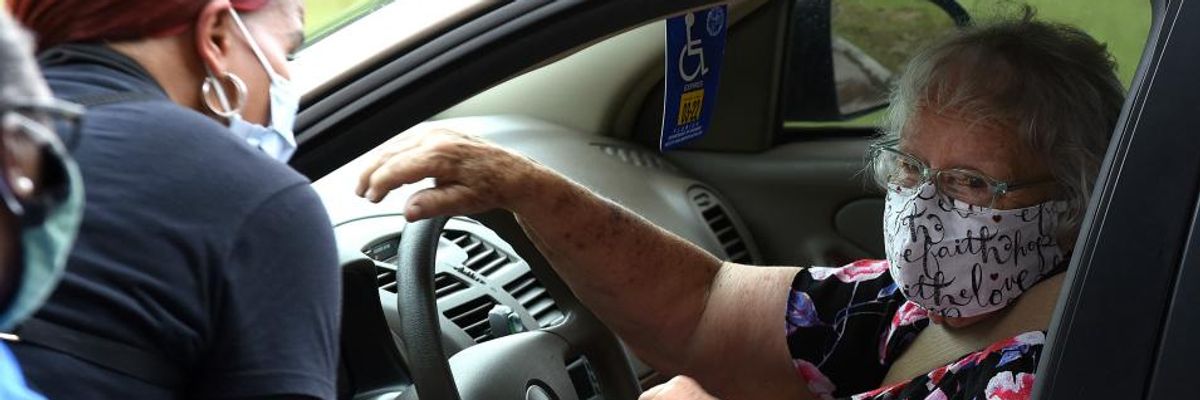There is something perverse about an economic system in which the stock market keeps climbing while people are dying. And in which 20 individuals can own as much wealth as the entire bottom half of the population. For the great majority of Americans without a share of the stock market, and for those who can't work from home, the pandemic is adding the prospect of a financial collapse to all their other concerns.
Half of America was In or Near Poverty BEFORE the Pandemic
Anywhere from half to three-quarters of Americans are living paycheck-to-paycheck. The American Psychological Association recently estimated that 62% of us are stressed by money issues. According to the Credit Suisse 2019 Global Wealth Databook, 34 million American adults are among the world's poorest 10%--because of debt.
But poverty is not just a number. We can skip past official measures that are based on an outdated 1950s cost of living. The World Bank defines poverty as "pronounced deprivation in well-being." That describes the millions of American workers in health care and personal care and food service and transportation and hospitality and retail who are now risking their lives.
There is poverty in the diminishing quality of life for Americans who are unable to pay for medical treatment during years of declining health, and instead turn to life-threatening opioid painkillers. Poverty is the stress of delinquent rent and mortgage payments; the steady decline of jobs that pay enough to support a family; the deadening impact of financial instability on physical and mental well-being. The United Nations describes America as a nation near the bottom of the developed world in safety net support and economic mobility, with the highest infant mortality rate in the developed world, the world's highest incarceration rate, and the highest obesity levels. Low-income Americans are often surrounded by food deserts, with insufficient access to clean water and sanitation, and with pollution levels that have been compared to third-world countries. The extreme level of inequality in the U.S. has triggered a surge in drug and alcohol and suicide "deaths of despair" that continue to increase among poor Americans during the COVID-19 crisis.
Big Tech Is Getting Richer
In March, 2020 the market capitalization for Big Tech (Apple, Microsoft, Amazon, Google, Facebook) was $4.1 trillion. In early July it was $6.6 trillion. A 60 percent increase in under four months! No one has profited more from 75 years of taxpayer input than these companies. But instead of supporting new jobs they're preparing their employees for a slowdown, while smaller tech companies are going right ahead with layoffs.
How It's Getting Worse for Over Half of America
The pandemic is primarily impacting low-income communities and people of color, cutting into their incomes, threatening their futures. Their job situations were precarious even before the virus hit. As Brookings notes, "A lack of labor market protections exacerbates these workers' insecurity...Fifty-three million Americans, 44 percent of the labor force, earn low wages." Recent changes in minimum wage laws could all be for nought. "One month could wipe out 10 years of progress," says Mark Muro of the Brookings Institution. And the misery will likely continue. The Federal Reserve Bank of Atlanta reports that firms do not anticipate regaining pre-COVID employment levels in 2021.
A Columbia University study predicts a "coming poverty epoch, rather than an episode"; although the university's Center on Poverty added that the effects could be mitigated by the federal CARES (Coronavirus Relief) Act. The suffering will be global, and long-term. The World Bank expects extreme poverty levels to persist throughout the coming year.
The pandemic has caused chaos in the American job market, but you wouldn't know it from free-market groups who insist that "we will be just fine." Both the World Economic Forum and Dell Technologies assure us that advanced computer technologies will drive the future job market.
But this is not the Industrial Revolution. Today's machines are doing our thinking for us. The creative work that remains is being done by fewer and fewer people. Most people are not technology-oriented, and they're not able to work with AI and iPhone apps and analytics.
Hope for the Future
It has already become clear that large-scale, coordinated federal government assistance makes a big difference. We are going to need a guaranteed income. Just a two-percent tax on total financial wealth would generate enough revenue to provide nearly a $14,000 annual stipend to every American household (including those of the richest families).
Or guaranteed jobs. Employment is waiting in long-neglected fields like social services. The work chosen by freed-up Americans may be entrepreneurial, as newfound incomes unleash talents that were previously suppressed by personal financial concerns. It could potentially take highly creative forms, as in the 1930s, when the Works Progress Administration hired thousands of artists and actors and musicians to help sustain the cultural needs of the nation.
The one certainty is that many of the ill effects of poverty will be relieved if people are given the opportunities that a rich nation can easily provide.

